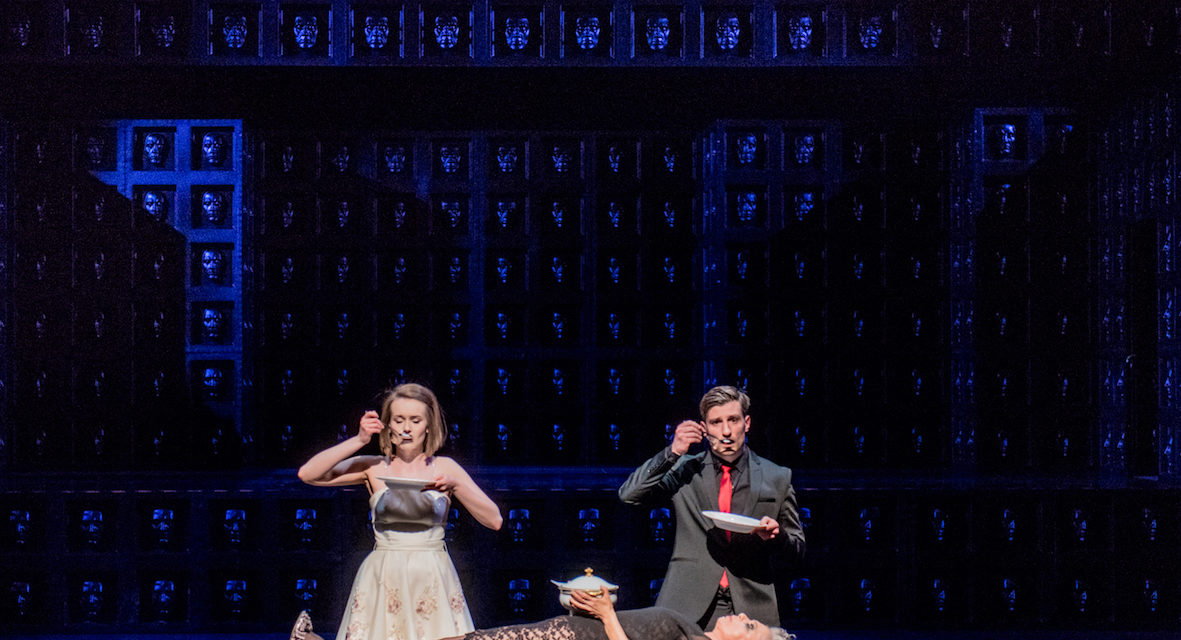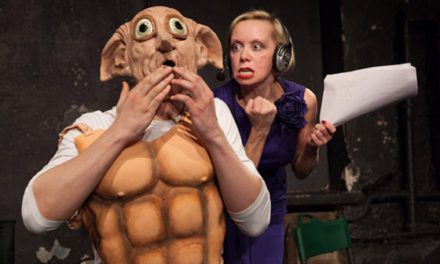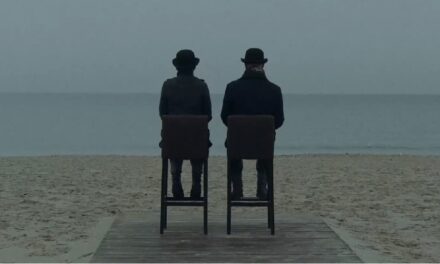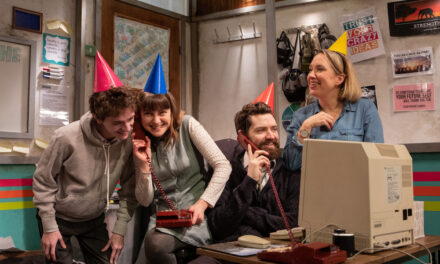Konformista 2029 [Conformist 2029], directed by Bartosz Szydłowski. Presented at Teatr Łaźnia Nowa—Duża Scena for the 2018 Boska Komedia Festival.
Now in its 11th season, the Boska Komedia Festival is simultaneously a showcase for the most discussed Polish productions of the year, a platform for experimental and progressive work, and an opportunity for emerging voices to present their plays. This review is just one of many in The Theatre Times covering the 2018 Boska Komedia Festival. To read more reviews from the festival, click here.
Conformist 2029, based on the 1951 novel by Alberto Moravia, Il Conformista, as well as the 1970 Bertolucci film of the same name, finds terror through precision. The play tells the story of Marcel, a young official for a fascist government who in his quest for conformity agrees to infiltrate the home of his former professor, now anti-fascist, hiding in Paris. Set up like a Christian station play (or more appropriately for the festival, like Dante’s Divine Comedy), Marcel moves from scene to scene interacting with increasingly absurd characters until his final confrontation in France. In this piece presented at the new Łaźnia Nowa Theater, director Bartosz Szydłowski and his team find fear and discomfort through each carefully controlled choice they make.
Szymon Czacki plays the lead role of Marcel with a frantic edge. On stage for the entirety of the 140 minute long play, Czacki makes full use of the wide and deep Łaźnia Nowa stage, running loops, rolling around, stopping and starting repeated sharp gestures of greeting and death at the audience. His several monologues carry that same energy and tightness, including a confession about his ambivalence regarding the sexual abuse he received as a child, as well as his secret pleasure in killing animals that he is desperately trying to bury. Czacki faces the audience as often as he can – in fact, most of the actors do just that – and it is through this blocking that we are able to see Czacki’s chaos within as he struggles to simultaneously hide his inner fears while forcing a mask of normalcy on his face. A repeated gestus of Czacki’s is a desperate ritual of meeting new people: shaking hands, adjusting his red tie (which wonderfully contrasts his all-black suit), and quick drawing finger guns. Szymon Czacki justifiably won Boska Komedia’s Best Actor award for his work.
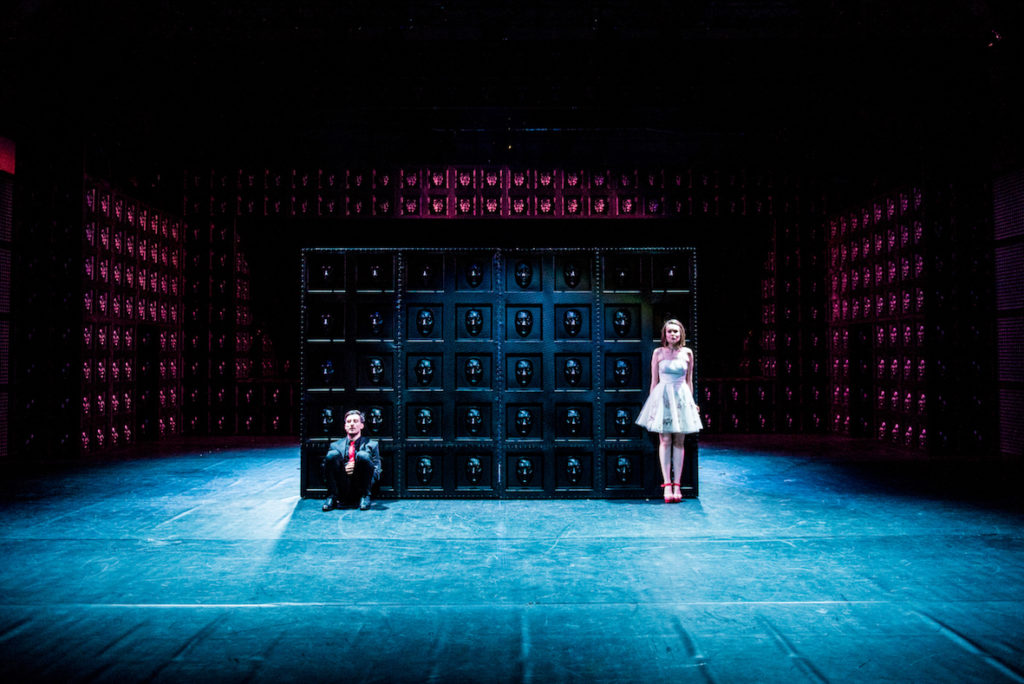
Conformist 2029 directed by Bartosz Szydłowski. Presented at Teatr Łaźnia Nowa—Duża Scena for the 2018 Boska Komedia Festival. Photo Credit: Monika Stolarska
Equally impressive, yet through a different means, is Anna Paruszyńska’s portrayal of Marcel’s excited new bride, Giulia. Paruszyńska plays Giulia with an absurd innocence. At one point bouncing non-stop, giggling, singing, and rejoicing at the prospect of marriage, at another time throwing a tantrum with fake tears sounding like nails on a chalkboard when she questions Marcel’s love for her. Paruszyńska’s portrayal of Giulia wonderfully clashes with Czacki’s indifference and also reveals the absurdity of Marcel’s pursuit of Giulia as a ‘suitable/normal’ wife in the name of conformity. Additionally, while Czacki’s achievement is the marathon maintenance of his struggle for normalcy, Paruszyńska’s is her evolution from disgusting innocent to complicit murderer. Her cold reenactment of her rape by a family friend was particular shocking.
Veteran actor Krzysztof Globisz returns to the stage and is particularly grounded and powerful as the Kurtz-like Professor Quadri that Marcel is seeking out. In the 11th hour of the play, Globisz delivers a monologue on intellectualism and free thought, based on a poem by Stanisław Barańczak, with particular vocal emphasis: drawing out each word, hyper-enunciating each syllable. Its effect is akin to an ancient chant or a Maori haka as Quadri stands his ground before his inevitable death.
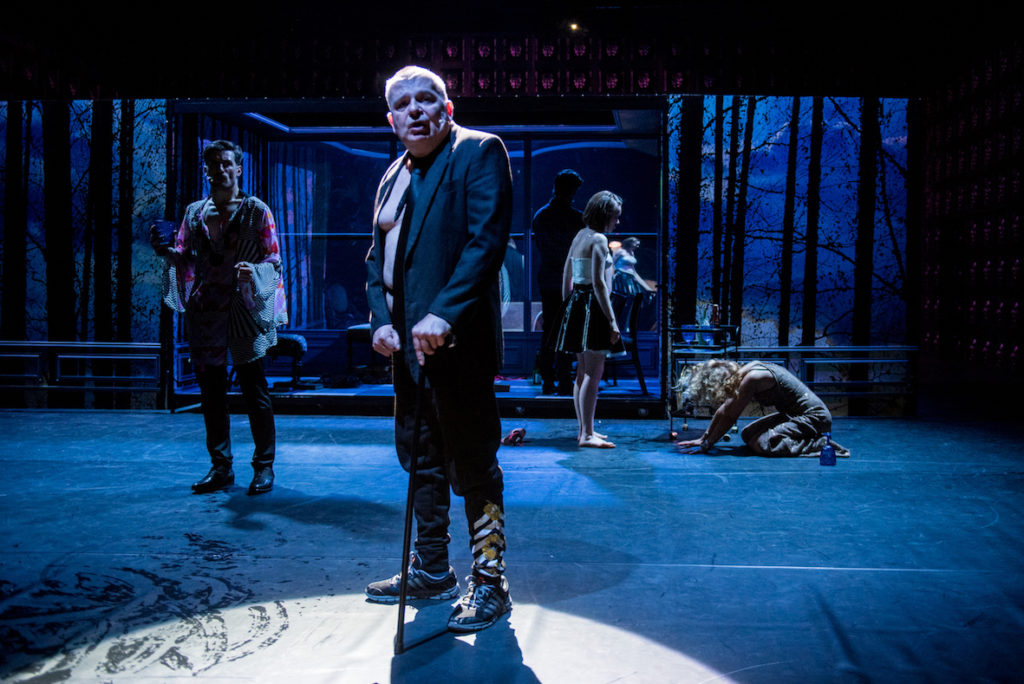
Conformist 2029 directed by Bartosz Szydłowski. Presented at Teatr Łaźnia Nowa—Duża Scena for the 2018 Boska Komedia Festival. Photo Credit: Monika Stolarska
Małgorzata Szydłowska, who designed the set, costumes, and lights, also helped coordinate the order to the play. Costumes are well tailored and chic, haircuts tightly coifed. In a humorous Mrożekian scene in the later half the play, Marcel and his government contact, in matching black suits converse while relieving themselves; upon their removal of identical pants, we see that they are both wearing identical striped red underwear.
The set was mostly bare for the near entirety of the show, allowing for ample playing (and running) space for the actors. Surrounding the stage were three walls of hundreds of identical blue/green masks, tightly organized. And when Marcel and Giulia finally reach Professor Quadri, a boxcar-like container is removed from one of the walls, revealing a living room on wheels in which Quadri and his wife are hiding.
To compliment his over-organized world, director Bartosz Szydłowski injects an additional layer of surrealism. The wedding feast of Marcel and Giulia takes place on top of the mother of the bride, who is acting like a corpse on the way to the grave. The board operator sings to the music throughout the play, which includes a club jam about Marcel’s mother’s new half-naked voguing lover, Akbar. At sporadic times during the play, a mob of children rushes the stage. One time the children breakdance, another time they play a call and response game that features a simulated neck snap. When Professor Quadri and his wife are eventually murdered, we see the mob of children invading their home, rotating their boxcar living room.
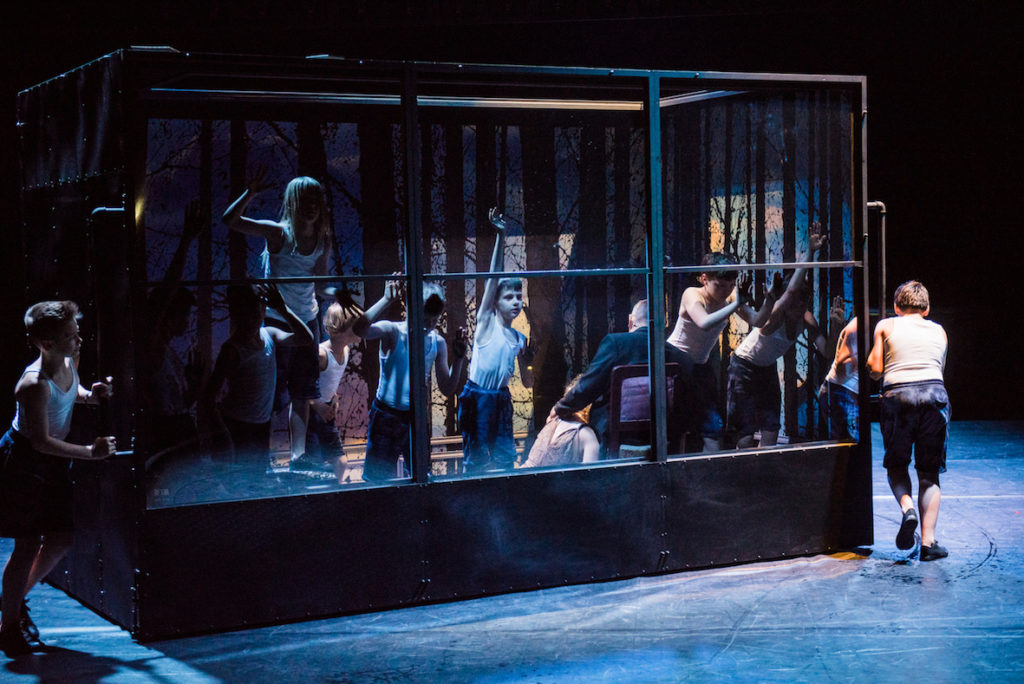
Conformist 2029 directed by Bartosz Szydłowski. Presented at Teatr Łaźnia Nowa—Duża Scena for the 2018 Boska Komedia Festival. Photo Credit: Monika Stolarska
This curious play begs the question: why give up freedom and chose fascist conformity? And while Szydłowski doesn’t necessarily have an answer, he does make sure to incorporate current events into his piece to amplify this concerning question. Allusions to the far-right governments of Poland and Hungary are sprinkled throughout. Marcel’s government contact in one scene rails about the Polish diaspora and the changing tides of immigration while he and Marcel perform committed Polish dances in their suits.
Upon his return after the Professor’s murder, Marcel is informed by another official that this assignment was in fact, canceled, but the message of cancelation was not delivered in time. Marcel’s entire journey, including the double homicide, was a waste. Less funny and more depressing than the black-humored ending of Burn After Reading. Marcel ends the play as he began, facing the audience, with his greeting/finger gun gestus. This time with even more desperation.
I realize that I make reference to other films, plays, and stories when reviewing this piece. And while I don’t believe that Szydłowski meant to invoke the specific references I was drawn to, this play does certainly encourage intertextual thinking. What is conformity after all if not the imitation of preexistence?
At some times, the play falters. Sometimes scenes drag on and don’t serve much purpose other than world-building. The scene at the professor’s apartment is particularly tired. Additionally, while Szydłowski creates a fascinatingly interesting world in the first half or so, little new is offered afterward and the play just barely starts to drift into stagnation. Conformist 2029 doesn’t quite end up more than the sum of its parts, but Szydłowski and his team do succeed in creating an animated yet cold world in which conformity is aggressively sought, even if murder is a price.
This special report from the 2018 Divine Comedy Festival in Poland was sponsored by the Adam Mickiewicz Institute and Emerson College. To read more reviews from the festival, click here.
This post was written by the author in their personal capacity.The opinions expressed in this article are the author’s own and do not reflect the view of The Theatre Times, their staff or collaborators.
This post was written by Rem Myers.
The views expressed here belong to the author and do not necessarily reflect our views and opinions.

